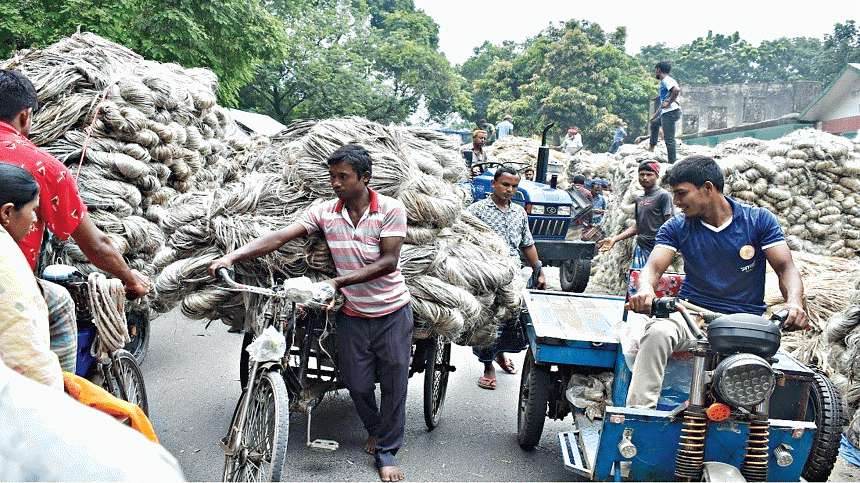Falling exports hit jute growers

Falling export of jute and jute goods is now having an effect on jute growers as prices of the natural fibre have fallen during the current harvesting season.
Cultivated as a cash crop, raw jute is fetching farmers at best Tk 2,700 per maund (around 37 kilogrammes) at local haats (market) of Faridpur, Pabna and some northwestern districts, reports our correspondents from there.
The current prices are nearly 15 percent lower than the Tk 3,200 or so they were getting in the same period a year ago.
The development comes at a time when farmers increased jute acreage by 2 percent to 7.45 lakh hectares in the current season, up from 7.29 lakh hectares previously, according to the data of the Department of Agricultural Extension.
Jute prices fell to Tk 2,500 to Tk 2,700 per maund this harvesting season, said Jahangir Alam, a farmer of Chinavatkur of Chatmohar upazila under the northwestern district of Pabna.
It would be difficult to realise production costs if price continues to remain lower than that in the previous year, said a jute grower
In the previous year, it was Tk 3,200 to Tk 3,300, he said.
It would be difficult for to realise production costs this year if prices continue to remain lower than that in the previous year, said Md Asadul Islam, another jute grower of the same upazila.
The situation is the same in Rangpur, a northwestern division.
Millers blamed declining exports of jute and jute goods, the third largest export earning sector after garment and leather and leather goods, for the prices of raw jute to have gone down.
Jute and jute goods exports dipped 19 percent year-on-year to $912 million in fiscal year 2022-23. This was the second consecutive year for exports to have reduced, according to data of the Export Promotion Bureau.
In July of fiscal year 2023-24, export earnings from the sector picked up by 3 percent to $63 million.
"Demand for jute products and jute yarn has fallen in the global market," said Helal Ahmed, chief operating officer of Janata Jute Mills and Sadat Jute Industries Ltd, one of the largest jute yarn and jute goods maker and exporter.
"So, mills are making purchases according to their requirement," he said.
"Besides, stockists who were active in the raw jute market in the last two years, are not buying this year as they have old stocks…They were unable to sell all the raw jute they had," he said.
The ratio of carry over stock would be over 20 percent in the sector, he added.
Farmers produced 84 lakh bales (one bale equals 180 kilogrammes) of jute in fiscal year 2022-23, up 0.3 percent year-on-year, according to the Bangladesh Bureau of Statistics.
Of the production, mills roughly use 65 lakh bales to make jute goods mainly for exports. A portion of raw jute is exported while the rest of the natural fibre is used locally, according to industry estimates.
The high prices of raw jute in the last two years prompted many carpet makers in importing counties to switch to alternatives to jute yarn, said Mohammed Mahbubur Rahman Patwari, a director of Bangladesh Jute Spinners Association, which represents yarn exporters.
"We have lost a significant portion of the market for this. There were blows on us for war in different parts of the world. Of late China, which was a good market for us, is also suffering from an economic slowdown," he said.
"Overall international demand for jute goods has tumbled," he said.
He said the demand from mills was not enough to make use of all the raw jute available in the country.
"Earlier, both millers and stockiest had been active in the market. Now, stockists are not buying as they have stocks," said Patwari, also managing director of Sonali Aansh Industries Ltd and a former chairman of Bangladesh Jute Mills Association.
He said India was a big buyer of raw jute.
Demand from the neighbouring country declined too, said Khondokar Alamgir Kabiar, proprietor of Tasfia Jute Trading at Daulatpur in the southwestern city of Khulna.
He said prices of raw jute of all grades have fallen this year.
Abu Sayed, general manager of Equ Jute Mill in Nilphamari, said the mill still has a good amount of last year's jute as it did not get the amount of orders from buyers as per its expectations.
"We still have not started making purchases as buyers' demand for jute bags and other finished goods is not satisfactory," he said.
(Our Pabna, Nilphamari and Faridpur correspondents contributed to the story)

 For all latest news, follow The Daily Star's Google News channel.
For all latest news, follow The Daily Star's Google News channel. 




Comments